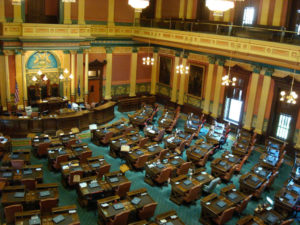Extension for court fee authority advances in House and Senate
 Legislation to secure key trial court funding has passed out of the House, and recently introduced Senate bills on the subject received a hearing in the Senate Judiciary Committee this week.
Legislation to secure key trial court funding has passed out of the House, and recently introduced Senate bills on the subject received a hearing in the Senate Judiciary Committee this week.
House Bill 5392 and Senate Bill 815, by Rep. Sarah Lightner (R-Jackson) and Sen. Sue Shink (D-Washtenaw) respectively, extend a quickly approaching May 1, 2024, expiration (“sunset”) of the authority of trial courts to levy fees that constitute a key part of their operational funding.
However, HB 5392 and SB 815 are “tie-barred” to a separate measure through actions of the House Judiciary Committee. The companion bills, HB 5534 and SB 814, by Rep. Kelly Breen (D-Oakland) and Sen. Stephanie Chang (D-Wayne) respectively, outline a plan for the State Court Administrative Office to conduct data collection on certain trial court costs and revenue sources and provide a report to the Legislature with proposals to implement the Trial Court Funding Commission’s recommendations from 2019. A “tie-bar” means both bills must advance together.
Now that the House bills have advanced to the Senate, MAC anticipates the Senate passing the legislation next week. With the bills headed to the Governor as early as next week, MAC expects the sunset to be extended prior to its expiration on May 1. Courts stand to lose nearly $50 million in operational funding annually if HB 5392 does not pass. This loss of revenue, if not covered by the state, will fall on the counties to cover.
Now, the Senate needs to give immediate effect to both bills, otherwise the legislation will not take effect until well after May 1.
MAC supports both HBs 5392 and 5534 and SBs 814 and 815, with our priority to move HB 5392 and extend the sunset prior to May 1.
MAC is asking members to take immediate action to urge quick legislative passage. Please visit MAC’s advocacy center to share your support and the need for immediate effect in the Senate for HBs 5392 and 5534 with your elected officials. The legislative window is closing, as there are limited days for the Legislature to advance the bills to the governor prior to May 1.
For more information on this issue, contact Samantha Gibson at gibson@micounties.org.
MAC working on changes to short-term rental legislation
 A 10-bill package designed to restrict ― but not eliminate ― local governments’ power to regulate short term-rentals, while allowing for a 6 percent excise tax was the subject of the House Local Government Committee meeting this week. House Bills 5437-5446 did not receive a vote in committee this week, and further hearings are anticipated.
A 10-bill package designed to restrict ― but not eliminate ― local governments’ power to regulate short term-rentals, while allowing for a 6 percent excise tax was the subject of the House Local Government Committee meeting this week. House Bills 5437-5446 did not receive a vote in committee this week, and further hearings are anticipated.
The primary bill in the package is HB 5438, by Rep. Joey Andrews (D-Berrien), which would require short-term rentals to be registered with the state; carry $1 million in liability insurance; have carbon monoxide detectors, smoke detectors and fire extinguishers; and have an emergency contact for renters within 30 miles of the rental. The bill would not allow a local government to ban short-term rentals but would allow communities to restrict their number.
MAC has not taken a formal position on the bills since counties are not defined as a local government under the legislation; do not have the authority to regulate the rentals; nor do they collect any portion of the proposed excise tax. The bill sponsor is open to amendments to recognize that many counties do the planning and zoning for municipalities and enforce building codes.
For more information on this issue, contact Deena Bosworth at bosworth@micounties.org.
Special elections renew 56-54 Democratic majority in House
 Democrats again will hold a 56-54 edge in the Michigan House of Representatives after two special elections held Tuesday.
Democrats again will hold a 56-54 edge in the Michigan House of Representatives after two special elections held Tuesday.
The House has been at a 54-54 standstill since Reps. Kevin Coleman (D-Westland) and Lori Stone (D-Warren) left office to serve as mayor in their respective hometowns.
Replacing Coleman will be Peter Herzberg, a Westland City Council member. Mai Xiong, a Macomb County commissioner, will be filling Stone’s seat in the 13th district.
It remains unclear when the new representatives will be sworn in. The Board of State Canvassers must certify the election first, and they are scheduled to meet on April 26. It is possible Xiong and Herzberg will be seated the following week, though it could be even later.
State law requires the Legislature to finish its budget work by July 1 each year, though there are no penalties to lawmakers for missing that deadline.
However, during election years, the Legislature traditionally breaks in late May or early June to return home to their districts for campaign work. That means there could only be about 12 or 15 session days between the new representatives being seated and the summer recess. While most of this time will be occupied with budget work, it is possible Democrats will take advantage of their renewed majority and advance some of their legislative priorities.
For more discussion on the legislative calendar, check out the latest episode of Podcast 83.

Learn your options about social media posting in April 22 webinar
Hosted by the Local Government Legal Center (LGLC), legal experts will lead a discussion of the Lindke v. Freed decision in which the Supreme Court set forth the test for when local government officials are considered “state actors” for the purposes of the First Amendment when they post on social media.
Click here to register. The webinar begins at 2 p.m. Eastern.
The LGLC is a coalition of national local government organizations formed in 2023 by the National Association of Counties (NACo), National League of Cities (NLC), International Municipal Lawyers Association (IMLA) and Government Finance Officers Association (GFOA) to provide education to local governments regarding the Supreme Court and its impact on local governments and local officials and to advocate for local government positions at the Supreme Court in appropriate cases.
Capital improvements are subject of April 22 ‘Fiscally Ready’ session
Recurring annual expenses are simple to budget, but repair and replacement of big-ticket items can be much more difficult. A Capital Improvement Program (CIP) will help your local government organize those major projects and forecast the expenses to make long-term planning simpler. This session will cover the basics of a CIP, best practices, and give participants a chance to share techniques that have worked for their community, as well as policies, procedures, and accounting for capital asset management and planning.
Click here to register for the event, which runs from 3 p.m. to 4:30 p.m. Eastern.
For more information about Fiscally Ready Communities, please check out the Treasury Fiscally Ready Communities webpage. This webpage includes Treasury’s 32-page Fiscally Ready Communities Best Practices document, which we encourage all local officials to review.
If you have any questions, email TreasLocalGov@michigan.gov with the subject line “Fiscally Ready.”
Recent News
Legislative Update 4-18-25
April 18, 2025
MAC testifies for public safety fund bills; House committee advances them Legislation to create a Public Safety Trust Fund advanced from the House Committee on Government Operations on Thursday after taking testimony from MAC and others in support of the concept....
Legislative Update 4-11-25
April 11, 2025
Deadline extended on Opioid Settlement Funds Survey The second annual opioid settlement county reporting survey will remain open until April 21. MAC, in partnership with Public Sector Consultants (PSC), is conducting the survey. The survey allows MAC to: Update the...
Legislative Update 4-4-25
April 4, 2025
Legislative Conference begins Monday in Lansing More than 300 county and business leaders will gather in Lansing April 7-9 to hear from state leaders and policymakers at the 2025 Michigan Counties Legislative Conference, co-hosted by MAC and the Michigan County...
Celebrate National County Government Month in April
March 31, 2025
National County Government Month (NCGM), held each April, is an annual celebration of county government. Since 1991, the National Association of Counties (NACo) has encouraged counties to actively promote county roles and responsibilities in serving residents. ...
Legislative Update 3-28-25
March 28, 2025
In Lansing, dollars are up for roads, down for veterans In this week’s episode, MAC’s Podcast 83 discusses the progress of a House GOP roads plan that is a “huge winner” for counties and a problem that has arisen in funding county veteran services grants. “Road...
Categories
Archives
Archives